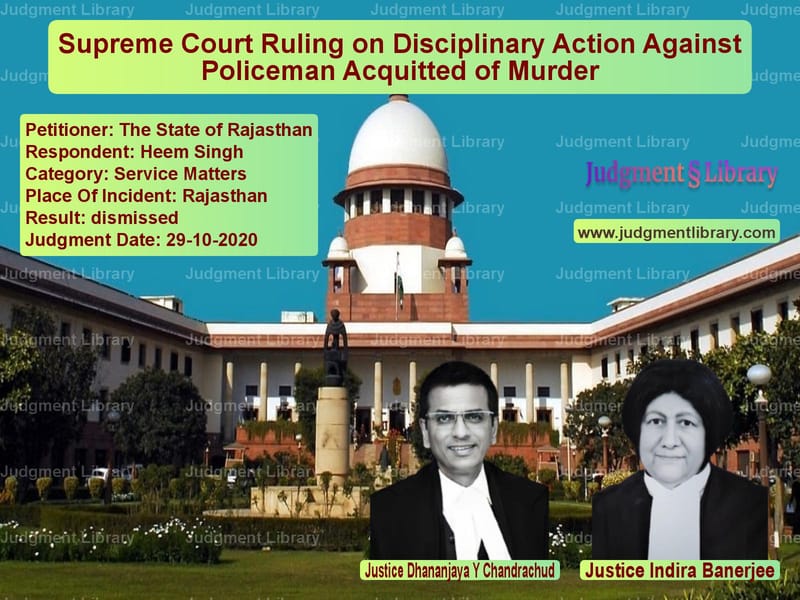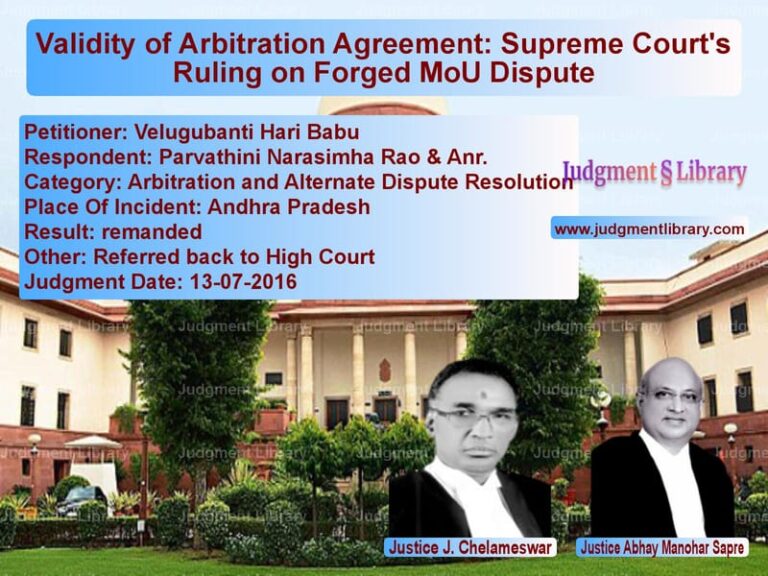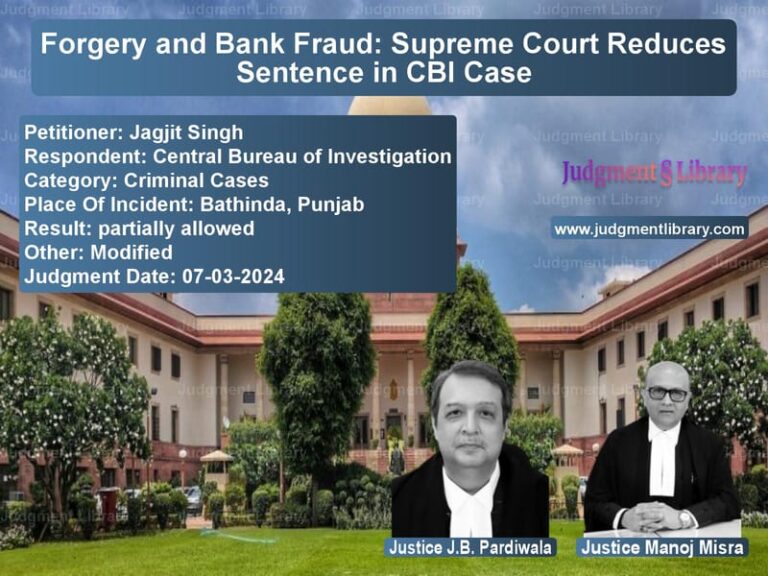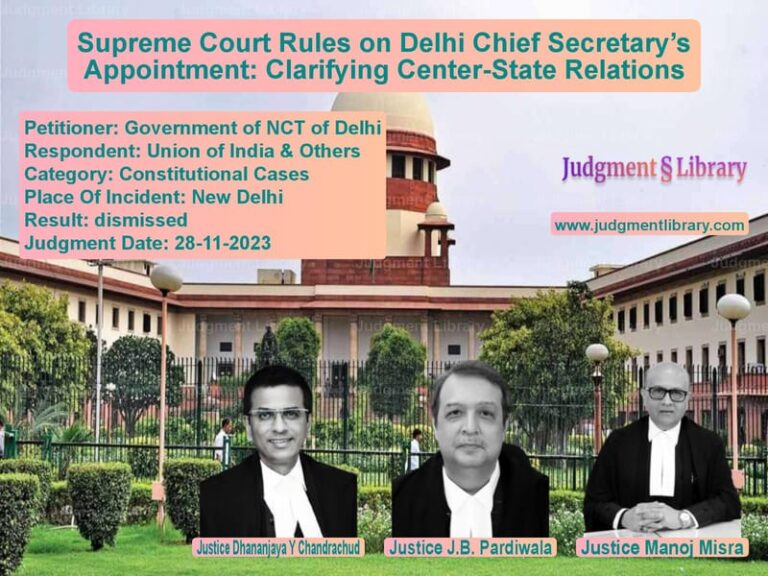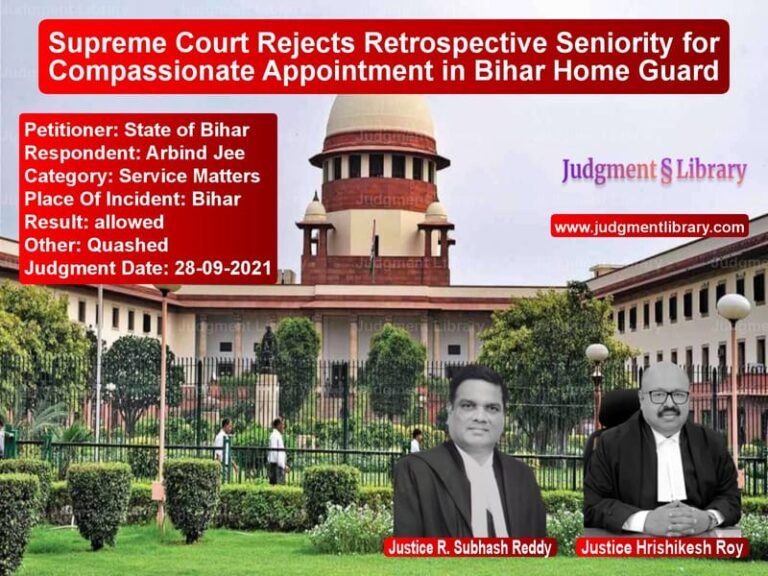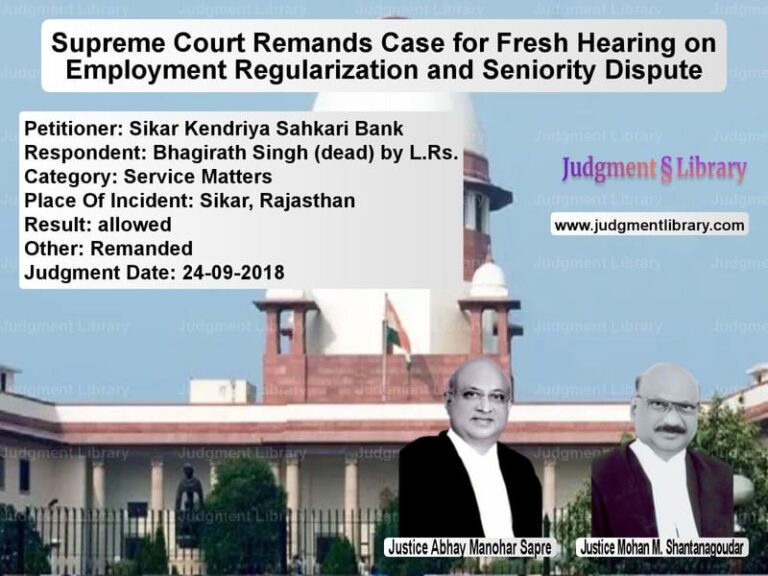Supreme Court Ruling on Disciplinary Action Against Policeman Acquitted of Murder
The case of The State of Rajasthan & Ors. vs. Heem Singh revolves around a crucial question: can a police officer be dismissed from service after being acquitted of murder in a criminal trial? The Supreme Court had to determine whether the disciplinary proceedings and dismissal of a police constable were valid despite his acquittal in a criminal case.
Background of the Case
The respondent, Heem Singh, was a police constable in Rajasthan. On August 13, 2002, he took leave but did not return to duty on time. During his leave, an individual named Bhanwar Singh was murdered. Heem Singh was later implicated in the crime and arrested on September 9, 2002. He faced trial under Sections 302, 201, and 120B of the Indian Penal Code (IPC).
However, during the trial, key witnesses turned hostile, and the prosecution failed to prove the charges beyond a reasonable doubt. On October 8, 2003, the Additional Sessions Judge acquitted him, granting him the benefit of doubt. Despite the acquittal, disciplinary proceedings were initiated against him, leading to his dismissal from the police service.
Key Legal Issues
- Whether an acquittal in a criminal case automatically entitles a government servant to reinstatement.
- Whether a disciplinary inquiry can proceed independently of the criminal trial.
- The standard of proof required in disciplinary proceedings versus criminal trials.
- The role of judicial review in disciplinary matters.
Arguments by the Petitioner (State of Rajasthan)
The state argued that:
- Disciplinary proceedings follow a different standard of proof than criminal trials; in criminal cases, guilt must be proven beyond reasonable doubt, whereas in disciplinary proceedings, it is based on a preponderance of probabilities.
- Despite the acquittal, evidence from the disciplinary inquiry suggested that Heem Singh’s actions had tarnished the police department’s reputation.
- The Rajasthan Civil Services Rules, 1958, empowered the authorities to dismiss an officer whose conduct was found unbecoming, even if he was acquitted in court.
- The High Court had overstepped its authority by re-evaluating the evidence presented in the disciplinary inquiry.
Arguments by the Respondent (Heem Singh)
Heem Singh contended that:
- The disciplinary proceedings were unjustified, as the criminal court had acquitted him.
- The inquiry process was flawed, as it selectively relied on prosecution witnesses while ignoring exculpatory evidence.
- The primary witness in the disciplinary inquiry, Jodh Singh, had admitted under cross-examination that he had implicated Heem Singh under pressure from local authorities.
- The findings in the disciplinary proceedings were based on circumstantial evidence, which had already been rejected in the criminal trial.
- His dismissal was unwarranted, given that he had served the police force for over a decade without any prior misconduct.
Supreme Court’s Observations
1. Standard of Proof in Disciplinary Proceedings
The Court reiterated that disciplinary inquiries are governed by the principle of a “preponderance of probabilities” rather than the stricter “beyond reasonable doubt” standard used in criminal trials. It noted:
“The departmental proceedings relate to service discipline, which does not require proof beyond a reasonable doubt but only a reasonable satisfaction of guilt.”
2. Effect of Acquittal in a Criminal Trial
The Court emphasized that an acquittal in a criminal trial does not automatically entitle a government servant to reinstatement. It observed:
“The verdict of acquittal in a criminal case does not bar the employer from proceeding with disciplinary action if the evidence justifies it.”
The Court noted that the criminal trial had resulted in an acquittal due to witnesses turning hostile and inconsistencies in testimony, rather than conclusive proof of innocence.
3. Findings in the Disciplinary Inquiry
The Supreme Court carefully analyzed the findings of the disciplinary inquiry:
- There was evidence of a long-standing enmity between Heem Singh and the deceased, Bhanwar Singh.
- Multiple witnesses testified that Heem Singh had threatened Bhanwar Singh before his murder.
- Eyewitness accounts placed Heem Singh near the crime scene on the day of the murder.
- The disciplinary inquiry concluded that, while there was insufficient evidence for a criminal conviction, the available evidence suggested serious misconduct on Heem Singh’s part.
4. Judicial Review and Scope of Interference
The Supreme Court held that the High Court had erred in re-evaluating the evidence from the disciplinary inquiry as if it were an appellate body. The Court stated:
“Judicial review in disciplinary matters is limited to examining whether the inquiry was conducted fairly, not to reappreciate the evidence.”
The Court reaffirmed that so long as the findings in the disciplinary proceedings were based on some evidence, they could not be set aside.
Final Judgment
The Supreme Court reversed the High Court’s order of reinstatement and upheld the disciplinary authority’s decision to dismiss Heem Singh from service. However, in the interest of justice, the Court directed that:
- Heem Singh’s dismissal would be converted to compulsory retirement.
- He would be entitled to pensionary benefits for the years of service he had completed.
- No back wages would be granted.
Implications of the Judgment
For Government Employees:
- Even if acquitted in a criminal trial, a government servant can still face dismissal if disciplinary proceedings establish misconduct.
- The burden of proof in disciplinary inquiries is lower than in criminal trials.
For Government Authorities:
- Employers have the right to conduct independent disciplinary proceedings irrespective of criminal trial outcomes.
- Disciplinary actions must be based on some evidence and follow due process.
Conclusion
The Supreme Court’s ruling in this case highlights the distinct nature of disciplinary proceedings and criminal trials. While an acquittal in a criminal case removes criminal liability, it does not necessarily clear a government servant of professional misconduct. The ruling underscores the importance of maintaining integrity in law enforcement and ensures that the police force remains beyond reproach.
Petitioner Name: The State of Rajasthan.Respondent Name: Heem Singh.Judgment By: Justice Dhananjaya Y Chandrachud, Justice Indira Banerjee.Place Of Incident: Rajasthan.Judgment Date: 29-10-2020.
Don’t miss out on the full details! Download the complete judgment in PDF format below and gain valuable insights instantly!
Download Judgment: The State of Rajasth vs Heem Singh Supreme Court of India Judgment Dated 29-10-2020.pdf
Direct Downlaod Judgment: Direct downlaod this Judgment
See all petitions in Disciplinary Proceedings
See all petitions in Termination Cases
See all petitions in Judgment by Dhananjaya Y Chandrachud
See all petitions in Judgment by Indira Banerjee
See all petitions in dismissed
See all petitions in supreme court of India judgments October 2020
See all petitions in 2020 judgments
See all posts in Service Matters Category
See all allowed petitions in Service Matters Category
See all Dismissed petitions in Service Matters Category
See all partially allowed petitions in Service Matters Category

